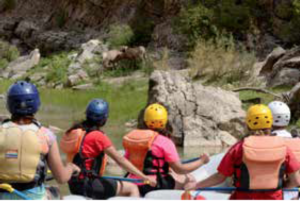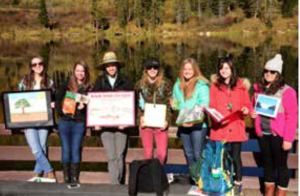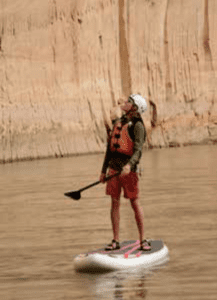Education & Communication
August 2015 | Volume 21, Number 2
BY DANIEL DUSTIN, NATE FURMAN, TAYLOR DICKINSON, and NATHAN BRICKER
In 1893, the historian Frederick Jackson Turner delivered his now famous paper, “The Significance of the Frontier in American History,” in which he pronounced both the end of the frontier and its centrality in shaping the American character (Turner 1893). What had been largely a rural society at the dawn of the 19th century was now an urbanized society at the beginning of the 20th century. This trend toward increasing urbanization of the United States continues to this day with a corresponding sense of the populace’s increasing separation from nature. What the 21st century will bring remains to be seen, but there is reason for concern about a society that is detached more and more from its biological moorings. Might Americans lose sight of their fundamental dependence on nature for their existence and in so doing lose sight of their obligation to be good stewards of the land community?
Under the circumstances, reacquainting each new generation with the natural world appears to be a wise investment in the future. This is true even for a state such as Utah, where one would expect to find a predominantly rural population. Utah, however, is one of the most urbanized states in the country, with approximately 90% of its residents living along Interstate 15, a concrete corridor connecting Provo, Salt Lake City, and Ogden. Utahans are disconnected from the land that sustains them as well (Pergams and Zaradic 2006). They spend 95% of their time indoors (Robinson and Godbey 1997). Utahans, too, could thus benefit from reconnecting with their fundamental ground of being.
Wilderness with Honors
The University of Utah’s Experiential Learning and Outdoor Recreation Education (U-EXPLORE) program is dedicated to facilitating that connection for its student body. Recognizing that the vast majority of Utah’s students come from urban backgrounds, and recognizing further that the university may represent the last best hope for introducing students to the state of Utah’s rich and varied landscape, U-EXPLORE’s mission is to cultivate enlightened generations of concerned citizens who will protect and preserve their natural heritage by exposing them to it, educating them about it, and showing them how to enjoy it in a socially and environmentally responsible manner.
U-EXPLORE offers field-based learning experiences under the auspices of the College of Health’s Department of Parks, Recreation, and Tourism. In addition to delivering a curriculum consisting of 60 outdoor recreation skill development courses for Utah’s general student body, U-EXPLORE has recently partnered with the university’s residential Honors College to offer a wilderness orientation experience for Honors freshmen. The intent of the residential Honors College is to challenge intellectually gifted incoming students by immersing them in hands-on learning experiences that ready them for making a positive difference in the world via community engaged projects.

Figure 1 – “Wilderness with Honors” students learning
firsthand about recreation ecology on Utah’s Green River. Photo by N. K. Bricker.
Students of all academic persuasions who choose to reside in the Honors College’s Outdoor Recreation and Leadership Community begin their collegiate years with a four-day float trip down Utah’s Green River through the Gates of Lodore in Dinosaur National Monument (Figure 1). In cooperation with O.A.R.S., one of the country’s premiere river running companies, the students complete the university’s orientation curriculum, which is intended to create a sense of community among them as they learn about the university and one another while negotiating river rapids, going for day hikes, cooking and camping together, and otherwise familiarizing themselves with the landscape that is Utah. The river trip promotes bonding, and it serves as a warm welcome to a university that can otherwise be characterized by feelings of isolation and anonymity because of its size (28,000 students) and commuter character. Most students travel to and from the University of Utah rather than live on campus. Commuter universities often have difficulty retaining students because of the absence of campus life, so the bonding that occurs during “Wilderness with Honors” is critical for developing a sense of community among the participants.
The “Wilderness with Honors” orientation experience is followed by the on-campus fall semester course Outdoor Recreation and Leadership, during which the Honors students learn additional outdoor recreation skills, develop an increased sensitivity toward the natural world through continued outdoor and environmental education, and demonstrate what they have learned about leadership in the context of outdoor recreation ecology. The class culminates in an end-of-the-course community-engaged learning project serving elementary schoolchildren from Salt Lake’s inner city. Typically, the project is conducted at the Silver Lake Nature Center in nearby Big Cottonwood Canyon (Figure 2). The Honors students are stationed at different points along the lake’s perimeter, and fifth graders visit each station to learn about the area’s natural and cultural history. The project brings closure to “Wilderness with Honors” in a way that demonstrates the relevance of what the students have learned in their first semester of college about their dependence on the natural world for their health and well-being.
“Wilderness with Honors” instructors understand that the “stripping down to the essentials” that wilderness outings entail illuminates human/nature interrelationships in a way that traditional classroom practices do not. The lessons stick because they are relevant to the students’ immediate circumstances. The instructors further understand that “nature’s university” (Dustin 2012) “is a place for celebrating the nonhuman side of life. People are not quite so special there. Rather, it is the unique function of nature’s university to cast human accomplishments and aspirations in their proper perspective” (Dustin 2012, p. 30). This is a significant lesson for young people to learn. At a time in their life when everything seems possible, it is important for them to consider their place in the order of things, to consider their limits, and to reflect on the meaning of restraint.

Figure 2 – “Wilderness with Honors” students ready to greet their fifth graders at the Silver Lake Nature Center with lessons
in natural and cultural history. Photo courtesy of N. K. Bricker.
A Signature Learning Experience
The University of Utah is committed to offering students a “signature learning experience” before they graduate (Figure 3). “Wilderness with Honors” satisfies this commitment at the beginning rather than the end of an undergraduate student’s collegiate experience. Moreover, while the university is understandably enthused about “Wilderness with Honors” because of its ability to help attract and retain high-quality students, U-EXPLORE’s enthusiasm is rooted in the effectiveness of wilderness as an experiential classroom for creating lasting impressions that will stay with students long after they leave the university. In this regard, “Wilderness with Honors”:
1. Ensures that students attending the University of Utah are well aware of the biodiverse landscape that is Utah before they begin their four-year matriculation. They are thus better positioned to make the most of their undergraduate years at Utah. Anecdotal reports suggest that students who have been through the “Wilderness with Honors” program tend to take a more active role in university life, feel more allegiance to the university, and otherwise take fuller advantage of what the university has to offer. “I can’t imagine a better scenario or a better way to have started college.”
2. Facilitates bonding among students who otherwise would begin their college days amid a sea of strangers. After only four days on the river, students report a strong sense of camaraderie. “I had a lot of fun, found a great community, and made memories I’ll keep for the rest of my life.”
3. Introduces students from all academic disciplines and departments to issues in recreation ecology that illustrate the power of experiential education and learning by doing.
“Before arriving in Utah, the only outdoors I cared for was my own yard in New Jersey. I had never really thought about how to care for nature or even what that entailed. The outdoors was simply at my disposal to use for whatever I wanted. It was an afterthought as to how I affected my surroundings. It was not until I took this class that I realized the importance of mindfully caring about the environment.”
Future Prospects
In its second year, “Wilderness with Honors” has grown in size from an initial group of 21 to the current group of 31. The Outdoor Recreation and Leadership course is now offered in the fall and spring semesters in seminar format to accommodate all of the students who participated in the preceding summer’s wilderness orientation experience. Clearly a success in the Honors College, other units of the university are now making inquiries about the possibility of expanding the program to serve their incoming students as well, including the law school, which would be a unique offering for a professional program. Where it will end is anyone’s guess, but U-EXPLORE’s goal is to make sure all students attending the University of Utah have an opportunity to get to know the land that is Utah and especially the wilderness that is Utah, in addition to the campus that is Utah. Indeed, a university-wide freshman wilderness orientation experience is not out of the question. To that end, U-EXPLORE’s leadership is now focusing on the following groundbreaking initiatives:
1. Creating discipline-specific wilderness orientation experiences highlighting the geology, geography, botany, biology, history, and so forth of Utah demonstrating the immediate relevance of what otherwise might be seen as esoteric subject matters in helping resolve pressing social and environmental problems; additionally, U-EXPLORE aspires to match new students with University of Utah faculty members who have an interest in, and passion for, promoting sustainable futures, including the future of wilderness; as one “Wilderness with Honors” alumnus put it:
“Having experts come in to talk to a class about their given expertise is one thing, but being able to go out with the same class and physically relate the topics of those talks to the real world is a great way to give students a deeper understanding of what sort of implications those topics have for real life –whether you are talking about watersheds, resource extraction, land use debates, or simply how and why we should care about and take care of the natural world and wilderness as a whole.”

Figure 3 – “Wilderness with Honors” student
contemplating the meaning of a “signature learning experience.” Photo by N. K. Bricker.
2. Attaching U-EXPLORE’s 60 outdoor recreation skill-development courses to Honors College writing courses (and potentially university-wide writing courses) to provide a wilderness context for writing about environmental issues; this initiative is intended to demonstrate the relevance of U- EXPLORE’s wilderness-based outings to the humanities as well as the natural and social sciences.
3. Cultivating Honors College student mentors (previous enrollees in “Wilderness with Honors”) to assist in teaching and writing about the benefits of the program and to aid in student retention at, and engagement in, the University of Utah at large.
Conclusion
The University of Utah is fortunate to have an Honors College program that understands the value of experiential learning and outdoor recreation education. The university is also fortunate to be located in a part of the United States that is rich in environmental history, beauty, and diversity. The ongoing challenge is to make sure that a higher education at Utah includes a fundamental understanding of, and appreciation for, the natural world that sustains humankind, no matter one’s academic specialty or professional calling. “Wilderness with Honors” is but a first step in that direction.
If, as Chawla (1998) concluded, young people should be exposed to nature early in life if they are to grow into adults who care about and protect the natural world, then the nascent learning-by-doing efforts described here should be expanded across land and sea to cultivate a worldwide citizenry that cares about and protects nature. Colleges and universities are well situated to carry on this important work (Schwab, Greenwood, and Dustin 2014), and wilderness provides an ideal outdoor classroom within which to conduct the lessons. To that end, we encourage other colleges and universities to expand on U-EXPLORE’s approach and apply it to their unique landscapes and wild places. Individually, we can make a positive and lasting difference in the lives of students within our sphere of influence. Collectively, we can change the world.
VIEW MORE CONTENT FROM THIS ISSUE
DANIEL DUSTIN is a professor in the Department of Parks, Recreation, and Tourism at the University of Utah.
NATHAN BRICKER and NATE FURMAN are co-coordinators of the Depart-ment’s University-Experiential Learning and Outdoor Recreation Education (U-EXPLORE) program. For further information about “Wilderness with Honors,” email Nate.Bricker@hsc.utah. edu or Nate.Furman@utah.edu
TAYLOR DICKINSON is an Honors student mentor and alumnus of the “Wilderness with Honors” program.
References
Chawla, L. 1998. Significant life experiences revisited: A review of research on sources of environmental sensitivity. Journal of Environmental Education 29(3): 11–21.
Dustin, D. 2012. Inside, outside, upside down: The Grand Canyon as a learning laboratory. In The wilderness within: Reflections on leisure and life, 4th ed. (pp. 27–30). Urbana, IL: Sagamore Publishing, LLC.
Pergams, O., and P. Zaradic. 2006. Is love of nature in the United States becoming love of electronic media? 16-year downtrend in national park visits explained by watching movies, playing video games, Internet use, and oil prices. Journal of Environmental Management 80(4): 287–293.
Robinson, J., and G. Godbey. 1997. Time for Life: The Surprising Ways Americans Use Their Time. State College, PA: The Pennsylvania State University.
Schwab, K., B. Greenwood, and D. Dustin. 2014. Service first: Embracing the scholarship of teaching and learning through active engagement in park and recreation education. Schole: A Journal of Leisure Studies and Recreation Education 1: 26–36.
Turner, F. 1893. The significance of the frontier in American history. A paper read at the meeting of the American Historical Association in Chicago, July 12.
